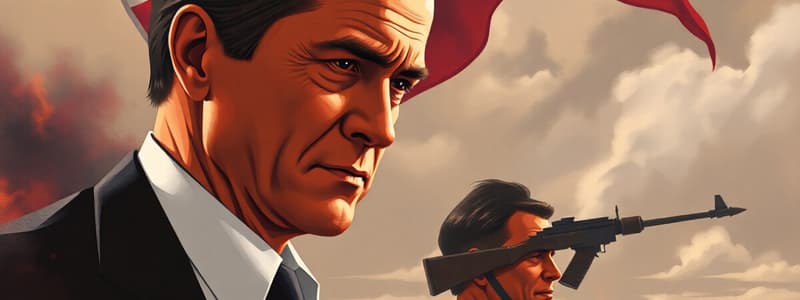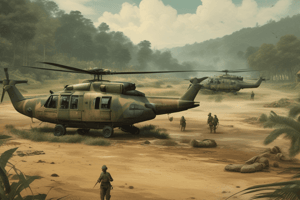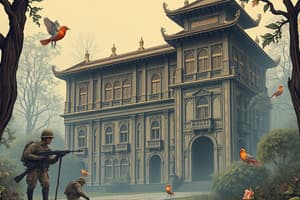Podcast
Questions and Answers
Which of the following best describes the economic situation in the USA immediately after World War II?
Which of the following best describes the economic situation in the USA immediately after World War II?
- A period of high growth and increased job creation. (correct)
- A shift towards agricultural economy.
- A period of economic stagnation due to war debts.
- A decline in employment opportunities.
What was the primary focus of President John F. Kennedy's administration?
What was the primary focus of President John F. Kennedy's administration?
- Focusing solely on domestic issues.
- Reducing military spending and space exploration.
- Increasing military spending and space exploration. (correct)
- Ignoring social reforms to focus on economic growth.
Which of these initiatives is most closely associated with President Lyndon B. Johnson's 'Great Society' agenda?
Which of these initiatives is most closely associated with President Lyndon B. Johnson's 'Great Society' agenda?
- Tax cuts for the wealthy.
- Deregulation of the financial industry.
- Increased military spending in Vietnam.
- Programs designed to reduce poverty and improve living conditions. (correct)
What was a significant foreign policy achievement during President Richard Nixon's administration?
What was a significant foreign policy achievement during President Richard Nixon's administration?
How did the Vietnam War impact the United States during the period discussed?
How did the Vietnam War impact the United States during the period discussed?
What characterized the political landscape within the United States during the post-World War II era until the 1960s?
What characterized the political landscape within the United States during the post-World War II era until the 1960s?
Which program or doctrine aimed to help other countries recover from the damages of war and contain communism?
Which program or doctrine aimed to help other countries recover from the damages of war and contain communism?
What major domestic event defined the presidency of Harry Truman?
What major domestic event defined the presidency of Harry Truman?
What was a key accomplishment during Dwight Eisenhower's presidency?
What was a key accomplishment during Dwight Eisenhower's presidency?
How did President Lyndon B. Johnson address civil rights during his time in office?
How did President Lyndon B. Johnson address civil rights during his time in office?
What role did Martin Luther King Jr. play during the presidency of Lyndon B. Johnson?
What role did Martin Luther King Jr. play during the presidency of Lyndon B. Johnson?
Imagine the US economy is facing a recession in 1950. Drawing from the policies enacted between 1945-1960, which action would most likely be taken by the government?
Imagine the US economy is facing a recession in 1950. Drawing from the policies enacted between 1945-1960, which action would most likely be taken by the government?
If it was discovered that a foreign power was attempting to spread communism in Western Europe in 1950, which US policy response would be most likely?
If it was discovered that a foreign power was attempting to spread communism in Western Europe in 1950, which US policy response would be most likely?
President Kennedy is in a meeting with his advisors. He wants to push for social reforms, but faces opposition due to the cost. Which action would align with his known priorities?
President Kennedy is in a meeting with his advisors. He wants to push for social reforms, but faces opposition due to the cost. Which action would align with his known priorities?
A law is proposed that would limit voting rights for minority citizens. Based on the actions taken in the 1960s, how would President Johnson most likely respond?
A law is proposed that would limit voting rights for minority citizens. Based on the actions taken in the 1960s, how would President Johnson most likely respond?
Which of the following events regarding US Presidents occurred in 1961?
Which of the following events regarding US Presidents occurred in 1961?
Which of the following best characterizes the US economy's development after World War II?
Which of the following best characterizes the US economy's development after World War II?
Which president is most closely associated with establishing the Health and Education ministries?
Which president is most closely associated with establishing the Health and Education ministries?
Which of the following accurately describes a key feature of President Nixon's foreign policy?
Which of the following accurately describes a key feature of President Nixon's foreign policy?
Which of the following options describe objectives that align with Kennedy's program?
Which of the following options describe objectives that align with Kennedy's program?
Which of the following best captures a central characteristic of US political life?
Which of the following best captures a central characteristic of US political life?
Which presidential action directly aimed to end the Vietnam War?
Which presidential action directly aimed to end the Vietnam War?
Which economic trend significantly boosted the US from 1945-1960?
Which economic trend significantly boosted the US from 1945-1960?
Flashcards
Who was Truman?
Who was Truman?
President of the USA who succeeded Roosevelt after his death.
Who was Johnson?
Who was Johnson?
President who initiated social reforms and established Ministries for Health and Education.
Who was Eisenhower?
Who was Eisenhower?
President during the Vietnam War who increased space research and military spending.
Who was Kennedy?
Who was Kennedy?
Signup and view all the flashcards
Who was Nixon?
Who was Nixon?
Signup and view all the flashcards
US economy 1945-1960
US economy 1945-1960
Signup and view all the flashcards
Kennedy program objectives
Kennedy program objectives
Signup and view all the flashcards
Nixon's policy
Nixon's policy
Signup and view all the flashcards
Cold War
Cold War
Signup and view all the flashcards
Political Stability
Political Stability
Signup and view all the flashcards
Marshall Plan
Marshall Plan
Signup and view all the flashcards
Truman Doctrine
Truman Doctrine
Signup and view all the flashcards
Superpower
Superpower
Signup and view all the flashcards
Purchasing Power
Purchasing Power
Signup and view all the flashcards
Welfare State
Welfare State
Signup and view all the flashcards
President Eisenhower
President Eisenhower
Signup and view all the flashcards
John F. Kennedy's Policies
John F. Kennedy's Policies
Signup and view all the flashcards
Lyndon B. Johnson's Policies
Lyndon B. Johnson's Policies
Signup and view all the flashcards
War on Poverty
War on Poverty
Signup and view all the flashcards
Civil Rights
Civil Rights
Signup and view all the flashcards
Martin Luther King Jr.
Martin Luther King Jr.
Signup and view all the flashcards
Voting Rights
Voting Rights
Signup and view all the flashcards
Post-War US Stability
Post-War US Stability
Signup and view all the flashcards
Study Notes
- After WWII, the U.S. economy weakened due to its involvement in the Vietnam War.
- The Vietnam War threatened Johnson's position and sparked widespread anti-war reactions.
- In 1968, American forces crushed a large anti-war movement.
- In the 1968 elections, Republican Richard Nixon won.
- Nixon ended the Vietnam War and restored diplomatic relations with China.
- Nixon was re-elected president and was forced to resign two years later due to a public scandal.
- After WWII, the U.S. economy developed rapidly.
- Many new jobs were created.
- Measures to strengthen welfare increased.
- Social reforms were carried out.
- Eisenhower was elected U.S. President, succeeding Truman.
- 1961: President Kennedy was assassinated.
- 1968: Nixon was re-elected President of the United States.
- Nixon resigns.
Match the columns regarding the U.S. Presidents after the war:
- Led the American state during WWII.
- He replaced President Roosevelt after his death.
- The US became involved in the Vietnam War.
- Established two new ministries: Health and Education.
- Increased military spending and investments for space exploration.
- Restored diplomatic relations with China.
- He took measures to reduce poverty.
- Provided funds for environmental protection.
- Ended the Vietnam War.
Studying That Suits You
Use AI to generate personalized quizzes and flashcards to suit your learning preferences.




